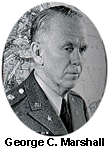

ASSASSINATION ATTEMPT: President Reagan was shot and wounded in an assassination attempt on March 30, 1981. He was shot as he left a Washington, D.C., hotel following a speech. The gunman was a 25 year old named John Hinckley. A jury found him not guilty by reason of insanity.

TR: Refers to President Theodore Roosevelt. He became President in 1901 following the assassination of President William McKinley. Roosevelt was elected in his own right in 1904 and served until 1909.
HERBERT HOOVER (1874-1964): Hoover was elected President of the United States in March 1928 and served until 1933. He became associated in the minds of many with the 1929 stock market crash and the economic depression which followed. A Republican, he was defeated for reelection in 1932 by Democrat Franklin D. Roosevelt.
CUBAN MISSILE CRISIS: One of the most dangerous periods of the Cold War came in October
1962. U.S. intelligence revealed the presence of Soviet nuclear missiles in Cuba. President Kennedy responded on October 22 by enforcing a naval blockade of Cuba and warned that further missile shipments by the Soviet Union would be intercepted. The superpower confrontation continued until October 28th when Soviet leader Khrushchev announced the missiles would be dismantled. In return, President Kennedy promised the U.S. would not invade Cuba, and in a secret agreement promised to remove U.S. nuclear missiles from Turkey.
COLD WAR: The period of rivalry between the United States and the Soviet Union which followed World War II. It developed as the U.S. brought the countries of Western Europe into its political influence while the Soviet Union maintained political dominance over Eastern Europe. The period was also marked by a rivalry between the two countries over the development of nuclear weapons. The Cold War officially ended in the late 1980s with the collapse of communism in the Soviet Union and the rise of independent, democratic governments in Eastern Europe.
POLIO: August 1921 Franklin Roosevelt was sticken with paralysis while vacationing at his summer home on Campobello Island off the coast of Maine. His ailment was diagnosed as polio. During his presidency, Roosevelt was confined to a wheelchair or stood with the aid of steel leg braces. He tried numerous treatments, but was never able to walk on his power again.
GARY HART (b.1936): U.S. Senator from Colorado (1975-86). He ran for the Democratic presidential nomination in 1984. He ran again for the 1988 nomination but abandoned the effort in May 1987 amid widely publicized stories of adultery. He reentered the race later that year, but lost the nomination to Governor Michael Dukakis of Massachusetts.
BLAINE-CLEVELAND CAMPAIGN: Refers the 1884 presidential race between Republican James G. Blaine of Maine and Democrat Grover Cleveland of New York. It was a bitter and personal campaign with Blaine accused of taking graft and Cleveland accused of fathering an illegitimate child. Cleveland won the election by a small margin of about 29,000 votes.
"YELLOW DOG DEMOCRAT:" According to the Morris Dictionary of Word and Phrase Origins, the term "yellow dog" refers to a mongrel or worthless thing. Die-hard Southern Democrats say they would rather vote for a "yellow dog" than a Republican.

GEORGE C. MARSHALL (1880-1959): Marshall was Chief of Staff of the U.S. Army in World War II. He later served as Secretary of State from 1947-49. During his tenure, a U.S. plan for post-war economic recovery in Europe went into effect and became known as "The Marshall Plan."
THE LANDINGS: Refers to the allied landing on the northern coast of France organized by Gen. Dwight D. Eisenhower. The "D-Day" invasion began on June 6, 1944.
FIRST CLASSMAN: The term refers to a member of the senior class at the U.S. Military Academy at West Point. It is common practice at the Academy for upperclassmen to haze freshmen, who are known as "plebes."
DAN QUAYLE: Vice President of the United States during George Bush's administration, 1988-1992. An Indiana native, Dan Quayle was a lawyer and newspaper publisher until he won a seat in the US House of Representatives at age 29. In 1980, he was elected to the Senate. As Vice President, Quayle campaigned for family values. His critics said he was too inexperienced.
WATERGATE: Refers to the scandal which erupted after a June 1972 break-in at
Democratic National Committee headquarters at the Watergate office building in Washington, D.C. The men who were convicted of the crime had been hired by President Nixon's reelection committee. The scandal deepened as the Senate held hearings on allegations that the President and his aides tried to cover up the administration's connection to the case. White House audio tapes later confirmed that President Nixon had ordered a cover up. In July 1974 the House Judiciary Committee voted to recommend impeachment of the President. Mr. Nixon resigned on August 9, 1974.
SPIRO T. AGNEW: Vice President of the United States during President Nixon's first and second terms. Agnew resigned the vice presidency in October 1973 after pleading no contest to felony tax evasion charges. President Nixon nominated Congressman Gerald Ford (R-Michigan), who was the House Minority Leader, to replace Agnew. Mr. Ford was sworn in as vice president in December 1973.
CARL ALBERT AND MIKE MANSFIELD: They were the Speaker of the House and the Senate Majority Leader, respectively, in 1973 when Vice President Agnew resigned.
NIXON PARDON: On Sept. 8, 1974, President Ford pardoned former President Nixon for any crimes he committed as president. The pardon came one month after Nixon had resigned the presidency in the wake of charges he had been involved in the Watergate cover up. The timing of the pardon led to questions about whether there had been a deal between Presidents Ford and Nixon before the resignation. President Ford denied any such deal before a congressional committee.
HOSTAGES IN IRAN: On Nov. 4, 1979, Iranian militants
loyal to the Ayatollah Khomeini took 66 Americans hostage at the U.S. embassy in Tehran. They were protesting the Carter Administration's decision to admit the recently deposed Shah of Iran to the United States for medical treatment. The U.S. refused the militants' demand that the Shah be returned to Iran for trial. A U.S. attempt to rescue the hostages failed in April 1980 when helicopters collided at a desert staging area. The hostages were eventually released in January 1981 shortly after Ronald Reagan was sworn-in as the new President.
PANAMA CANAL TREATIES: Agreements between the U.S. and Panama signed on September 7, 1977. The treaties provided for the transfer of control over the Panama Canal from the U.S. to Panama.
THEODORE "TEDDY" ROOSEVELT: Roosevelt succeeded to the presidency in 1901 following the assassination of President William McKinley. He was elected in his own right in 1904, but decided not to seek a third term in 1908. Four years later, Roosevelt challenged his successor, President William Howard Taft, for the Republican presidential nomination. He failed in that effort and mounted a third party candidacy. His National Progressive Party was nicknamed the "Bull Moose Party" because Roosevelt had said he felt "fit as a bull moose." In the general election, Roosevelt came in second to Democrat Woodrow Wilson, with President Taft running third.
PERSIAN GULF WAR: The Persian Gulf War began on the night of Jan. 16-17, 1991 with a U.S. air assault on Iraq. The attack was precipitated by Iraq's refusal to withdraw from neighboring Kuwait, which it had invaded in August 1990. President Bush declared a ceasefire on February 28, 1991 after the defeat of Iraq's armed forces.
THEODORE C. (TED) SORENSEN (b. 1928): He was Special Counsel to President Kennedy and Mr. Kennedy's chief speechwriter. He was noted for the ability to write speeches which captured the President's speech rhythms.
RECOGNIZING ISRAEL: On May 14, 1948, Israel declared itself an independent state. That same day, President Truman announced U.S. recognition of Israel, making the U.S. the first country to recognize the new state.
KOREAN WAR: The conflict began in June 1950 when North Korean forces (allied with the Soviet Union and the People's Republic of China) invaded South Korea (allied with the U.S.). A resolution by the UN Security Council called for UN members to assist South Korea. President Truman ordered U.S. troops to help defend the South in an effort to stem the expansion of communism. By November Chinese forces had joined the North Korean side. An estimated 3 million people died in the fighting, including some 54,000 Americans. An armistice was declared on July 27, 1953.
MOHAMMED MOSSEDEQ (1880-1967): Prime Minister of Iran from 1951 until 1953. He nationalized Iranian oil, forcing the departure of the British Oil Company. His power struggle with Iran's monarch, the Shah of Iran, led to the Shah's brief exile from Iran in 1953. But a few days later, the Shah was returned to power in an army coup, with the support of the U.S. government. Mossedeq spent three years in prison for treason, then spent the rest of his life under house arrest.

AYATOLLAH KHOMEINI (1902-1989): The spiritual leader of Iran's Shi'ite Muslims. He led a revolution in 1979 which overthrew the Shah of Iran and established an Islamic republic.
MR. McNAMARA'S BOOK: Refers to "In Retrospect: The Tragedy and Lessons of Vietnam" (1995) by Robert S. McNamara who served as Secretary of Defense in the Kennedy and Johnson Administrations. In that capacity he was a key player in developing U.S. policy during the Vietnam War. In his book, written twenty years later, he says those decisions were "terribly wrong."
NATIONAL MALAISE: President Carter gave a speech about the energy crisis on July 15, 1979 which became known as his "national malaise" speech. In fact, the President never used those words. Prior to the speech, Carter aides told reporters the word "malaise" had been used at a Camp David meeting where the President had discussed how to tell the American people that they must conserve energy. The speech which resulted from that meeting was therefore dubbed the "national malaise" speech by the press.
EDMUND G. "PAT" BROWN (1905-1996): A California Democrat, he was governor of the state from 1959 until 1966 when he was defeated by Republican Ronald Reagan.
ALEXANDER HAIG (b.1924): An Army general who served as chief of staff to President Nixon at the end of his administration. In later years, he served as Commander-in-Chief of the U.S. European Command and Supreme Allied Commander, Europe. In 1981 he was appointed Secretary of State by President Reagan.
BARRY GOLDWATER: (b. 1909): Republican U.S. Senator from Arizona (1953-64, 1969-87). He was the Republican nominee for president in 1964, but defeated by President Johnson. Often called "Mr. Conservative," he is considered a philosophical godfather to supporters of President Reagan and other modern day conservatives.

| Welcome | Broadcast | Essays | Forum | Quotes | Links | Home |